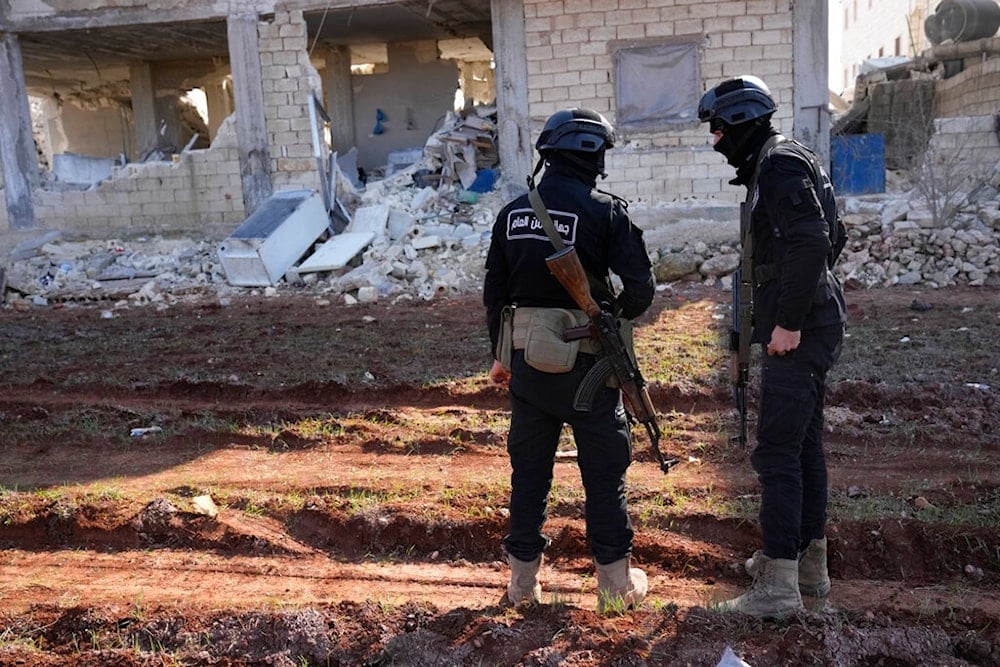Kiev supports HTS to target Russia, Iran interests in Syria: Exclusive
Al Mayadeen Net's sources say the terrorist group is exploiting ongoing events in Lebanon and Gaza to reorganize its ranks following internal turmoil in recent months.
-

Militants of the al-Qaeda-linked Hay'at Tahrir al-Sham organization stand in front of a destroyed house in Atareb, Syria, Sunday, Feb. 12, 2023. (AP)
Hay’at Tahrir al-Sham (HTS) terrorist group, formerly known as Jabhat al-Nusra, is attempting to bolster its influence by engaging in regional conflicts, aiming to serve the agendas of states seeking to undermine the interests of Syria’s allies, such as Iran and Russia.
This follows revelations of coordination and cooperation between HTS and Ukrainian intelligence. New information has emerged indicating intelligence collaboration between HTS in Idlib and Ukraine to carry out operations targeting Russian sites in Syria.
According to information obtained by Al Mayadeen Net, Ukrainian intelligence has been providing HTS with weapons and financial support to prepare for these operations, which include drone strikes and isolated attacks near the frontlines in southern Idlib, northern Latakia, and northwest Hama.
In this context, Al Mayadeen Net's sources in Idlib confirmed that HTS has established extensive training camps to recruit new fighters.
The sources indicated that these recruits are being trained in advanced combat tactics, including the use of drones and the manufacturing of improvised explosive devices (IEDs).
They added that these camps have attracted militants of various nationalities, with reports indicating a flow of foreign militants joining the training in preparation for combat in Ukraine against Russian forces.
According to the sources, HTS' decision to establish training camps in Syria comes after efforts to establish similar camps in Ukraine were hindered by repeated Russian military strikes.
Moscow has monitored these developments with significant concern.
The Russian Foreign Ministry has issued statements expressing dissatisfaction with the coordination between HTS and Ukraine, warning that such activities represent a serious escalation and may compel Russia to take additional military measures to counter these threats.
Russian officials have also noted that such alliances negatively impact regional stability and further complicate the Syrian conflict.
In September, Russian Foreign Minister Sergey Lavrov disclosed information about Ukrainian intelligence operatives being present in the de-escalation zone in Idlib, tasked with recruiting fighters from HTS for what he described as “their heinous operations.”
In the same month, a source within the Syrian opposition told Sputnik that Kiev provided a shipment of drones to the Hay'at Tahrir al-Sham terrorist group, in exchange for experienced terrorists capable of forming units from Uyghur and Chechen fighters.
Kiev requested leaders with experience among the Chechens and Uyghurs to establish combat units composed of mercenaries from the Caucasus region to support the Ukrainian armed forces, according to the source.
In the same vein, the Syrian newspaper Al Watan cited sources as saying that the head of Ukraine's intelligence service, Kyrylo Budanov, is in constant contact with the leader of the Hay'at Tahrir al-Sham terrorist group on recruiting terrorists in Syria's Idlib for the Ukrainian armed forces.
Meanwhile, HTS is exploiting ongoing events in Lebanon and Gaza to reorganize its ranks following internal turmoil in recent months. The group has restructured its leadership and strengthened its positions in Idlib by digging new tunnels extending toward the Turkish border after the Turkish military uncovered and destroyed some of these tunnels in previous operations.
The expansion of this infrastructure highlights HTS’ efforts to secure new supply routes and prepare for potential confrontations.
On another front, public discontent against HTS in Idlib remains strong, with daily protests demanding the ousting of its leader Abu Moammad al-Julani, and the release of thousands of detainees in the terrorist group's prisons.
However, al-Jolani’s new alliances beyond Syrian borders have enabled him to consolidate his control over the areas under HTS dominance.
Read more: Russia: Extremists in Ukraine use same methods as terrorists in Syria

 4 Min Read
4 Min Read










